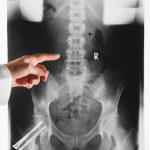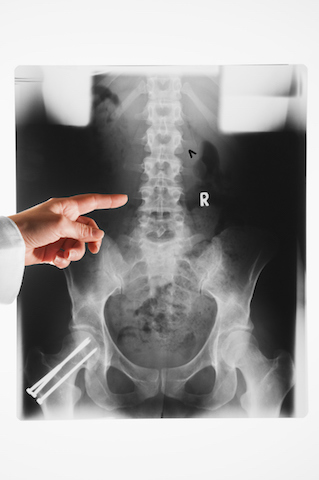Keeping your bones strong and healthy requires more than eating foods high in calcium like dairy products. We already know from a previous article that taking calcium supplements will not increase bone strength. In fact, calcium supplements may even weaken bone and cause other serious health problems. Let’s explore what other vitamins and minerals you need to be supplementing with in order to keep your bones strong and healthy. In this post, I will focus on supplementing with vitamin D, vitamin K2, and magnesium to help keep your bones strong and healthy.
Vitamin D Supplements to Keep Your Bones Strong
Vitamin D is a fat-soluble hormone-like vitamin that is made largely by your skin when it is exposed to the sun. Although vitamin D has many important roles in the body, with respect to bone strength it does the following:
- increases the absorption of calcium in your gut
- maintains proper calcium and phosphate levels in the blood, which in turn allows for hardening of the bone to protect against osteoporosis, rickets, and fracture
Vitamin D increases the absorption of calcium in your gut
Vitamin D Deficiency and Lab Tests
Because vitamin D deficiency is very common in North America, making sure you are getting enough vitamin D is important to keep your bones strong and healthy. (1, 2, 3) However, how much you need is a tricky subject matter.
Ideally, you want to get your levels of vitamin D in your blood measured. Labs measure this using a blood marker called hydroxyvitamin D or 25(OH)D. You want your levels between 75-150 nmol/L (30-60 ng/mL). (4, 5, 6, 7, 8) From here you can determine if you need to supplement with vitamin D, eat more foods with vitamin D in them, or get more sun exposure if you can. Or perhaps, you need to stop supplementing with vitamin D because your levels are too high.
It’s also important to get your vitamin D levels checked while you are supplementing as you want to avoid vitamin D toxicity. There is a general consensus within the wellness field that a dose of 4000 I.U./day for an adult is the ideal amount. However, what if you absorb it really well and this amount causes your levels to rise to 125 to 150 nmol/L (50-60 ng/mL) or above? Toxic levels of vitamin D can cause the following (9):
- nausea
- vomiting
- diarrhea
- constipation
- heart attack
- stroke
- calcification of soft tissues
- kidney stones
- weight loss
- anorexia
- low bone density
If you do need to supplement with vitamin D, make sure you are getting your levels checked every 3 to 6 months to determine what your daily dose should be. Furthermore, you may need to stop supplementing in the summer. If you are outside a lot in the summer and your skin is exposed to the sun, you may be producing plenty of vitamin D.
Vitamin D Supplements
Here are some of the supplements I would recommend that contain vitamin D (vitamin D3):
Rosita’s Extra Virgin Cod Liver Oil
Food Sources of Vitamin D
A mixture of sun, supplements, and food are probably going to work best for most people. Most people will only get about 10% of their vitamin D daily needs from food. Here is a list of foods that contain vitamin D:
- cod livers or cod liver oil
- fatty fish salmon, herring mackerel, marlin, sardines, rainbow trout, fatty tuna
- egg yolks (pasture raised have 4 to 6 times more vitamin D than conventional egg yolks)
Vitamin K2 Supplements to Keep Your Bones Strong
One of the most important roles of vitamin K2 is to keep calcium in hard tissues like your bones, teeth and nails and to keep calcium out of soft tissues like your arteries. (10) This is vital in regards to bone health and cardiovascular health.
There is excellent research that shows vitamin K2 (11, 12, 13, 14, 15, 16):
- increases and maintains bone mass density
- decreases the risk of bone fractures
- can help prevent the loss in bone height in the spine
This means that vitamin K2 can help prevent osteoporosis, osteopenia, and other disorders that involve calcium deficiency in the hard tissues.
Vitamin K2 keeps calcium in hard tissues like bone to help prevent osteoporosis and osteopenia.
Food Sources of Vitamin K2
Vitamin K2 is hard to get from food which is why I recommend supplementing with it. By the way, vitamin K2 is not the same as vitamin K1. Vitamin K1 is found in leafy greens such as kale and collards, and in the body and is used mainly for blood clotting. Vitamin K2 is found most often in fat from animal products and some fermented foods. Here are a list of foods that have vitamin K2 in them:
- Natto (a fermented soy product from Japan)
- Grass-fed (not grain-fed), full-fat dairy products (especially cheeses like Gouda and Brie cheeses)
- Poultry liver (particularly goose liver)
- Pastured raised egg yolks
- Organ meats (pancreas and kidney) from pastures raised animals
- Raw sauerkraut
Vitamin K2 Supplementation
Vitamin K2 supplementation may be necessary for people who do not eat natto, organ meats or full fat grass fed dairy products. My guess is that most people would fall into this category.
There are two types of vitamin K2: MK7 (from natto) and MK4 (synthetic and identical to the K2 in animal fats). MK7 lasts longer in the body, so you need a lower dose than an MK4 supplement. There is no known toxicity in taking K2 at this time. The recommended dose per day would be 100 – 1000 mcg/day.
Contraindications for Vitamin K2
Supplementing with vitamin K2 may be contraindicated in people who take blood thinners like Coumadin (warfarin). If you are on blood thinners I would recommend you make the effort to get vitamin K2 from foods instead.
Magnesium Supplements to Keep Your Bones Strong
Most of the body’s magnesium is stored in bone and it is one of the key minerals that make up the structure of bone. A deficiency in magnesium, which is very common, will cause the body to pull or take magnesium from the bones. Therefore, magnesium deficiency is a known risk factor for osteoporosis.
Magnesium is also needed by the body to make vitamin D, help transport or taxi vitamin D around the body, and turn it on so the body can use it.
Magnesium deficiency is very common and is a known risk factor for osteoporosis.
So you can start to see how magnesium, vitamin D and vitamin K2 work together to manage your calcium levels and maintain bone strength. If you’re taking calcium supplements and vitamin D supplements but you’re low in magnesium, that’s a bad combination.
Magnesium has hundreds of other important roles in the body. Because of this, and the fact that magnesium deficiency is common, supplementing with magnesium is vital.
I would recommend a minimum dose of 400 mg/day and 800 mg/day for those with higher needs. Chelated forms of magnesium like magnesium glycinate and malate tend to absorb better.
For more detailed information on magnesium supplementation and food sources of magnesium please read a previous article I wrote.
The dose of up to 800 mg/day would not be expected to cause any toxic symptoms. However, I would build up to that dose gradually. A sign of too much magnesium would be loose stools.
Conclusion
In conclusion, maintaining strong and healthy bones goes beyond just consuming calcium-rich foods. While calcium is essential, supplementing with vital nutrients like vitamin D, vitamin K2, and magnesium is crucial for optimal bone health.
Vitamin D plays a pivotal role in calcium absorption, maintaining proper levels of calcium and phosphate in the blood, and consequently, in bone strength. However, ensuring adequate levels of vitamin D requires careful monitoring, as deficiency is common and excessive supplementation can lead to toxicity.
Vitamin K2 is essential for directing calcium into bones and teeth while preventing its accumulation in soft tissues, contributing significantly to bone density and reducing the risk of fractures. Although it’s not readily available in many foods, supplementation may be necessary, especially for those with limited dietary intake.
Magnesium, another critical mineral for bone health, not only makes up a significant portion of bone structure but also aids in vitamin D metabolism and utilization. Deficiency in magnesium can compromise bone integrity, emphasizing the importance of supplementation, particularly for individuals with higher requirements.
Incorporating a balanced approach of sunlight exposure, dietary sources, and supplements can help maintain optimal levels of these essential nutrients for bone health. However, it’s crucial to monitor levels regularly and consult with a healthcare professional to ensure safety and effectiveness in supporting strong and healthy bones. By prioritizing these supplemental nutrients alongside a well-rounded diet and lifestyle, you can enhance your bone health and overall well-being in the long term.
For a healthy spine and nervous system, contact Edmonton chiropractor Dr. Dean Collins. Or book a consult and exam with him today.
To learn more about how chiropractor care can help you and your family, read Dr. Collins’ comprehensive guide to chiropractic care: Chiropractic Care for Everyone.
Sign up for our Dr. Collins’ newsletters and blog posts
Sign up Dr. Collins’ newsletters to receive vital information on how to keep your spine and nervous system healthy as well as how to help optimize your health and avoid chronic illness.



Leave a Reply